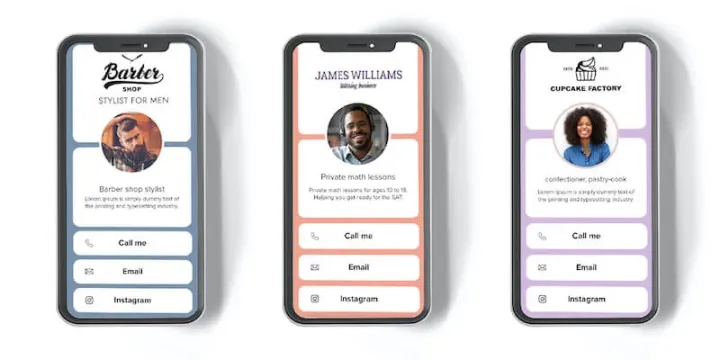Revolutionizing Networking: The Rise of the Digital Business Card in Modern Business
Posted by Shraa MRFR
Filed in Technology 151 views
In an increasingly digital world, traditional paper business cards are gradually giving way to more dynamic, eco-friendly alternatives. Digital business cards have emerged as a revolutionary tool for professionals, entrepreneurs, and businesses looking to modernize how they connect and share contact information. These electronic alternatives offer convenience, interactivity, and adaptability—features that resonate with the fast-paced digital ecosystem of today.
With the global business landscape becoming more interconnected and virtual, the adoption of digital business cards has become a necessity rather than a novelty. They allow individuals to share their professional identity instantly through a QR code, a clickable link, or a contactless tap—redefining the way networking takes place in the 21st century.
What is a Digital Business Card?
A digital business card, also known as an electronic or virtual business card, is a digital format of the traditional paper card. It contains all the essential contact information like name, job title, phone number, email, website, and social media links. However, unlike the physical version, it offers additional functionality such as embedded videos, real-time updates, clickable links, and even direct calendar scheduling options.
These cards can be shared via email, text, social media, NFC technology, or QR codes, making them accessible and environmentally friendly. They eliminate the limitations of physical cards, such as getting lost, running out of stock, or becoming outdated.
Key Features and Functionalities
Digital business cards come equipped with advanced features that go beyond the simple exchange of contact details. For instance, many platforms allow users to include multimedia content such as promotional videos, LinkedIn profiles, or testimonials. Some digital cards support integration with CRM tools, allowing businesses to track leads and follow-ups efficiently.
Another standout feature is real-time editing. Users can update their contact information at any time without the need to reprint or redistribute. This ensures that recipients always have the latest details, promoting better connectivity and fewer communication errors.
Benefits of Using Digital Business Cards
The advantages of digital business cards are manifold. First and foremost is sustainability. By going paperless, companies and individuals contribute to reducing environmental waste—a growing concern in today’s corporate culture. Additionally, digital cards are cost-effective, removing the need for regular reprinting and redesigning.
From a branding perspective, digital business cards offer a much higher level of customization. Users can tailor the design, colors, fonts, and media to align with their personal or corporate identity. This enhances brand consistency and leaves a lasting impression on clients or partners.
Moreover, these cards promote seamless networking, especially during virtual events or remote meetings. Sharing a digital card can be as easy as sending a link or scanning a QR code, ensuring that no opportunity to connect is lost.
Popular Digital Business Card Platforms
Several platforms have capitalized on this growing trend by offering intuitive and user-friendly digital business card solutions. Apps like HiHello, Linq, CamCard, Mobilo, and Blinq allow users to create, customize, and share digital cards with ease. These platforms often provide additional features such as analytics, lead management, and CRM integrations, catering to both individual professionals and large enterprises.
Most of these services offer both free and premium plans, making them accessible to a wide audience—from freelancers and startups to established corporations.
Use Cases Across Industries
Digital business cards are not confined to one specific sector. Their utility spans across various industries such as real estate, healthcare, finance, IT, and education. Real estate agents can share property listings via their card, while healthcare professionals can link to appointment scheduling systems.
In industries where first impressions matter, such as marketing or design, digital business cards offer a way to showcase creativity and innovation. The ability to embed portfolios, videos, or social proof directly within the card adds significant value to any professional introduction.
Security and Privacy Considerations
While digital business cards offer convenience and modern features, it is essential to consider data security and privacy. Reputable platforms use encryption and secure servers to protect user data. It is also important for users to choose what information they wish to display and keep private, especially when sharing cards online or through public platforms.
Some platforms offer settings that allow you to control who sees your information and how it is shared, ensuring a safer networking experience. Additionally, having backup and export options ensures data isn’t lost if a platform becomes inaccessible.
The Future of Networking
The future of professional networking is undoubtedly digital. As hybrid and remote work models continue to dominate, digital business cards are expected to become the standard for exchanging contact information. Innovations such as artificial intelligence, augmented reality, and blockchain could further enhance these tools, making them more secure, interactive, and integrated.
Forward-thinking professionals are already replacing their paper cards with digital versions to stay ahead in the networking game. As more people become accustomed to QR codes, smart links, and contactless interactions, digital business cards will only grow in relevance and adoption.
Source - https://www.marketresearchfuture.com/reports/digital-business-card-market-10696
The digital business card is not just a modern substitute for paper cards—it is a transformation of the way professionals connect, share, and maintain relationships. By offering interactivity, sustainability, and real-time adaptability, it aligns perfectly with the needs of the contemporary business environment.
Whether you're an entrepreneur, a corporate executive, or a freelancer, embracing digital business cards can enhance your personal brand, simplify networking, and set you apart in a crowded digital space. As the world continues to move toward digital-first solutions, now is the perfect time to make the switch.
